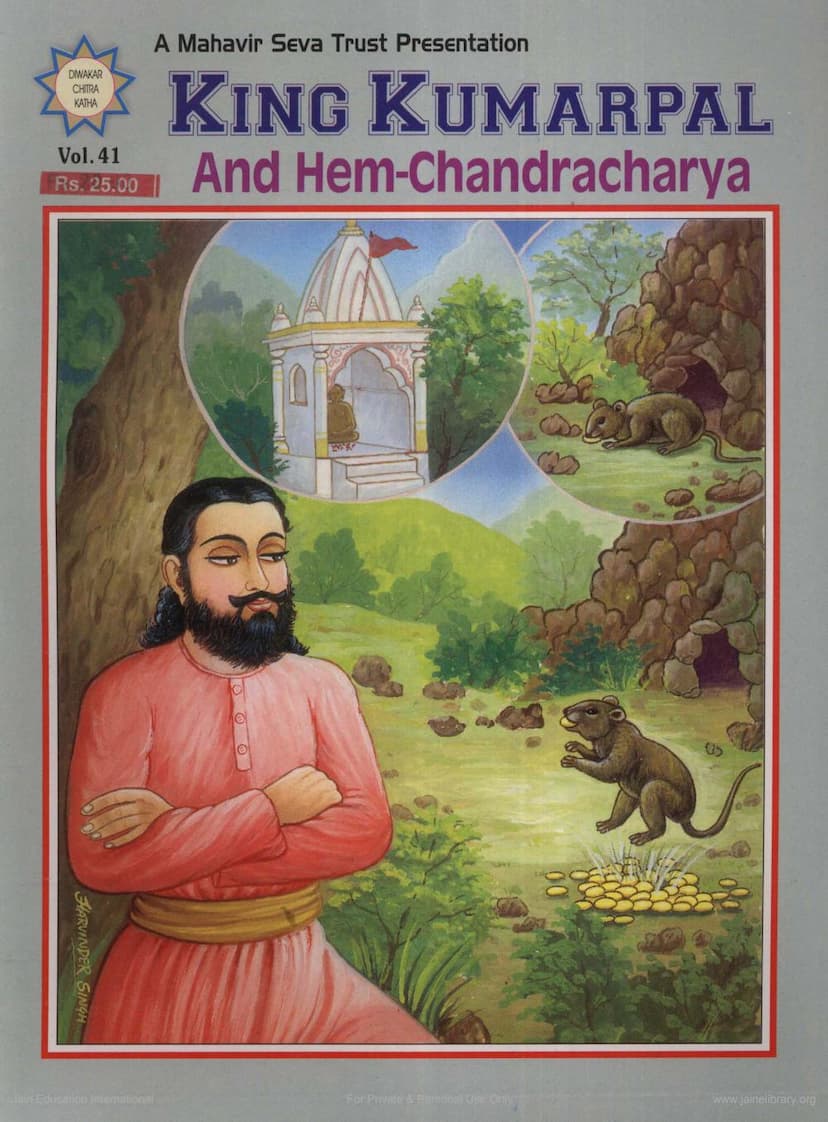Kumarpal And Hemchandracharya Diwakar Chitrakatha 041
Added to library: September 2, 2025

Summary
Here's a comprehensive summary of the Jain text "Kumarpal and Hemchandracharya Diwakar Chitrakatha 041" in English:
This picture story, "King Kumarpal and Hem-chandracharya Diwakar Chitrakatha Vol. 41," published by Mahavir Seva Trust, Mumbai, and authored by Acharya Shrimad Vijaya Nityanand Suri, Chidanandmuni, and Shreechand Surana, chronicles the significant influence of the Jain scholar Acharya Hem-chandracharya on King Kumarpal of Gujarat. The book highlights how their combined efforts led to the all-round progress and affluence of Gujarat.
Key Themes and Events:
- Influence of Acharya Hem-chandracharya: The text emphasizes that King Kumarpal, from the outset of his reign, was deeply influenced by Acharya Hem-chandracharya. This influence instilled in him virtues like a love for knowledge, kindness, compassion for all beings, devotion to Jina and his guru, and religious tolerance.
- King Kumarpal's Virtuous Reign: Upon ascending the throne, Kumarpal immediately implemented bans on violence, alcoholism, and other vices, reflecting his adherence to Jain principles.
- Pursuit of Knowledge: Despite his age (over fifty), Kumarpal humbly sought to learn Sanskrit from Acharya Hem-chandracharya. He diligently studied advanced texts, even composing a panegyric of Tirthankars and seeking ways to popularize Jain literature.
- Promoting Jain Literature: Kumarpal's keen interest in learning led to a significant literary project. Under Acharya Hem-chandracharya's guidance, numerous disciples transcribed scriptures. Kumarpal supported this by arranging for quality writing materials and ensured the production of hundreds of books. He even commissioned copies of the "Trishashtishalakapurush Charitra" (biographies of 63 eminent personalities) to be made with golden and silver ink, which were then ceremonially paraded and distributed to libraries.
- Miracle of Faith (Palm Leaves): When the supply of palm leaves for writing ran out, King Kumarpal, demonstrating immense faith and devotion, prayed to the tree spirits. The next morning, the palm trees in his garden miraculously produced beautiful, smooth leaves, allowing the literary work to resume. This was attributed to the divine grace and the king's unwavering faith.
- Social Reforms:
- Abolition of "Rudati Vitta" (Widow Tax): Kumarpal learned of a cruel custom where, in the absence of a male heir, a family's entire wealth was confiscated by the state upon the death of the head. This left widows destitute. Moved by the plight of a wealthy merchant's widow, Kumarpal abolished this custom, prioritizing justice and compassion over state revenue, earning praise for his generosity and public welfare.
- Prohibition of Animal Sacrifice: During the Navaratra festival, priests insisted on animal sacrifice to appease the family deity. Kumarpal, adhering to his vow of non-violence, devised a plan. Animals were sent into the temple but the gates were sealed, and guards were posted. The next morning, all animals were found alive, revealing the ritualistic hypocrisy. Kumarpal then declared that deities are pleased by devotion, not flesh, and prohibited animal sacrifice, ensuring offerings of normal food.
- Confrontation with King Karna: When King Karna of Kalyan-katak threatened to conquer Gujarat, Kumarpal sought Acharya Hem-chandracharya's counsel. The Acharya prophesied King Karna's imminent death within seven days. This prophecy proved true when King Karna, while marching towards Patan, was accidentally hanged from a tree by his own necklace.
- The Omniscience of Hem-chandracharya: The text illustrates Acharya Hem-chandracharya's "Kalikaal Sarvajna" (omniscient of the current era) status through several events. He could predict King Karna's death, understand the significance of Devabodhi's actions in extinguishing a fire with a touch of his palms, and reveal the hidden secrets behind these events to a curious King Kumarpal.
- Repentance for Violence (Louse Incident): A merchant named Khemu killed a louse, violating the king's strict prohibition even on killing such small creatures. Soldiers arrested him and presented him to the king. Instead of severe punishment, Kumarpal, recognizing the merchant's sincere repentance, ordered him to build a Jina temple as atonement. This temple became known as "Yuka Vihar" (Louse Temple).
- Repentance for Violence (Mouse Incident): Recalling a past incident where he stole coins from a mouse, leading to the mouse's death, Kumarpal felt immense guilt. He confessed to Acharya Hem-chandracharya and was instructed to build a Jina temple at the spot where the incident occurred. This temple was named "Mushika Vihar" (Mouse Temple).
- Construction of a Temple in Khambhat: In memory of Acharya Hem-chandracharya saving his life, Kumarpal decided to build a grand temple in Khambhat, which was overseen by his minister Vagbhat and housed a gemstone image of Bhagavan Mahavir.
- Confrontation with Sultan Mohammed of Gazni: When Sultan Mohammed of Gazni invaded Gujarat, Kumarpal was torn between his vow of limited movement during Paryushan Parva and his duty as a king. Acharya Hem-chandracharya assured him that religion protects all. Through the Acharya's yogic power, the Sultan was mysteriously brought to Patan while asleep, imprisoned, and then respectfully returned to his camp after agreeing to a six-month peace treaty and declaring Ahinsa in his kingdom.
- Pilgrimages and Succession: Kumarpal undertook seven pilgrimages with Hem-chandracharya, including to Shatrunjaya and Girnar. He later established a well-constructed road to the summit of Girnar mountain to facilitate pilgrimages for the elderly. Concerned about his succession, he disinherited his nephew Ajayapal, deeming him debauched and anti-religious, and declared Pratapmalla as his heir.
- Prophecy of Death and Passing: Kumarpal faced conspiracies against him. Acharya Hem-chandracharya prophesied his own death in six months and Kumarpal's death six months thereafter. As the prophecy unfolded, King Kumarpal, weakened by age and a poisoning attempt orchestrated by Ajayapal (the anti-toxin mysteriously missing from the treasury), accepted his impending death. He took the ultimate vow (Chauvihar Santhara) and peacefully passed away while meditating on his guru.
In essence, "King Kumarpal and Hem-chandracharya Diwakar Chitrakatha 041" is a compelling narrative that showcases the profound impact of Jain philosophy and spiritual guidance on a king's reign, leading to a golden age of progress, social reform, and spiritual enrichment in Gujarat. It highlights themes of devotion, knowledge, ethical governance, and the power of faith.